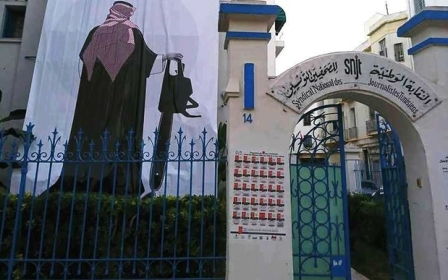Youth group starts ‘red vests movement’ to ‘save Tunisia’

A Tunisian group has started a “red vests” movement in protest against poor economic conditions in the Arab world’s only successful democracy.
Emulating the anti-austerity French yellow vests protests, the group said it was driven by the “failure and corruption” of the system, unemployment, inflation and the continuation of “a policy of systematic impoverishment”.
In its first statement, posted on Facebook last Friday, the group said one of its founders, Borhan Al-Ejlani, was arrested as a result of the “paid smear campaign” against the group in the wake of its launch.
The group added that it seeks to “save Tunisia” from its current woes, and criticised the “lack of vision” amongst the political elite and the increasing gap between it and the people.
It said the statement is only the beginning of their campaign activities, which they said have gained the support of many Tunisians.
It cited the results of the latest municipal elections in May in which the two largest parties - the nationalist Nida Tounes and the Muslim democratic Ennahda - lost at least half their support in favour of independent candidates.
The leaders of Nida Tounes, which lost two thirds of its support, accused the prime minister, Youssef Chahed, of failing to deliver economic reforms and suspended his party leadership over disagreements with the party leader, Hafedh Essebsi.
The results came as an embarrassment to the party, which subsequently lost its parliamentary majority after nearly half its MPs joined a new parliamentary bloc formed by Chahed in the aftermath of the crisis.
In September, Essebsi announced an end of his party’s political alliance with Ennahda over the latter’s continued support for Chahed.
Growing protests
Meanwhile, teachers have staged strikes this week against salary cuts, and Tunisian lawyers have protested against a proposed finance law which they say would "violate the privacy agreements between them and their clients," according to a statement by the Tunisian Order of Lawyers.
Tunisia witnessed 746 social protests in November, according to the monthly social protests index published by the Economic and Social Rights Forum.
Tunisia’s economy has been hard hit since autocrat Zine El Abidine Ben Ali was ousted in the 2011 revolution, triggered by record levels of inflation, poverty and unemployment.
Chahed, in office since August 2016, has spearheaded an aggressive reform plan following a bailout deal with the International Monetary Fund (IMF) aimed at cutting the North African country’s chronic fiscal deficit.
Chahed’s implementation of the IMF deal required a set of tough austerity measures and structural reforms such as cutting fuel subsidies, reducing the public sector wage bill and increasing taxes.
The reforms have been mainly opposed by the powerful General Labour Union (UGTT), whose 670,000 members constitute nearly 5 percent of Tunisia’s population and were hard hit by the reforms.
The union called for partial strikes on 24 October and 22 November to protest the Chahed government’s failure to raise the salaries of hundreds of thousands of public sector employees.
A general strike is planned for 17 January, days after the eighth anniversary of the 2011 revolution. It will be the second general strike since the February 2013 general strike that followed the assassination of prominent leftist human rights lawyer Chokri Belaid.
Stay informed with MEE's newsletters
Sign up to get the latest alerts, insights and analysis, starting with Turkey Unpacked
Middle East Eye delivers independent and unrivalled coverage and analysis of the Middle East, North Africa and beyond. To learn more about republishing this content and the associated fees, please fill out this form. More about MEE can be found here.




